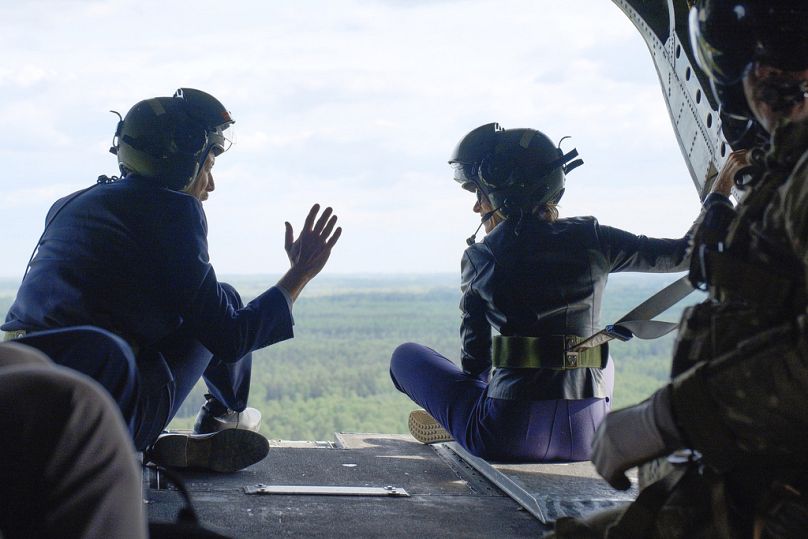Kaja Kallas said the West needed a “coordinated approach” against threats from Moscow, as alleged cases of sabotage, electronic warfare and espionage increased.
Estonian Prime Minister Kaja Kallas has left the annual Spring Storm military exercises, which showcase cooperation with NATO.
However, she was thinking of other types of war.
Estonia, which borders Russia, has seen an increase in acts of sabotage, electronic warfare and espionage – all allegedly provoked by Moscow.
While the war in Ukraine appears to be turning in Russia’s favor, defenses are being strengthened in frontline countries Estonia, Latvia and Lithuania, as well as Finland and Poland.
Taking a step back from the May 16 exercise, Kallas said Russia was waging a “shadow war” against the West.
Lithuanian President Gitanas Nauseda urged caution, saying on Tuesday he had information that “sabotages could happen again.”
“Reports about Russia’s intention to unilaterally redraw the maritime borders of the Baltic Sea are a provocation with the aim of escalation,” he wrote on X.
“We are carefully monitoring the situation with our NATO allies.”
Polish Prime Minister Donald Tusk said at least nine people were recently arrested on suspicion of beatings and arson attacks allegedly orchestrated by Russian secret services.
Not everyone sees the attacks as connected, Kallas told The Associated Press, despite NATO’s assertion this month that Moscow is escalating its campaign against the alliance. Russia denies these accusations.
Amid sanctions against several Russian intelligence agents, Western officials and experts say the Kremlin is changing tactics — from non-military strategies including cyberattacks, election interference and disinformation to targeting enemies of President Vladimir Putin.
As key elections are held in the West, officials say the pace of these activities will only increase, and some want tougher countermeasures.
Estonia has taken the challenge of tracking down Russian agents of influence “very seriously” since gaining independence from the USSR in 1991, rebuilding its security services from scratch, US Ambassador George Kent told the AP.
This year, a university professor was arrested in Estonia for espionage for Moscow.
Thirteen people were arrested after the attack, which was allegedly organized by Russian military intelligence under diplomatic guise. Flights between Finland and the city of Tartu were interrupted due to Russian jamming of GPS signals.
“What I would like to see is an acknowledgment that these are not isolated events,” Kallas told the AP. “Secondly, to share information about it with each other. Third, make it as public as possible.
Estonia has a reputation for aggressively pursuing its espionage activities and making them public, consistently catching more Russian agents per capita in the country of 1.3 million than in other European countries.
“It is not very likely” that there are such a large number of agents in Estonia facilitating their capture, Kusti Salm, permanent secretary of the Estonian Defense Ministry, said in an interview with the AP.
Former Estonian President Toomas Hendrik Ilves told a US news agency that some countries are taking no action because they hope to do business with Russia again.
“People fear decisive action, and the lack of decisive action encourages bad actors to keep trying,” Ilves added.
That could lead to unintentional deaths and injuries, Estonian officials and security experts say, citing Russia’s tendency to leave attacks to the local population, sometimes relatively cheaply recruited. This makes it more difficult to identify links between the attacks or their origin in Russia.
Bulgarian investigative journalist Christo Grozev, who exposed the involvement of Russian intelligence services in the poisoning of former spy Sergei Skripal in Britain in 2018 and the late opposition leader Alexei Navalny in 2020, were victims of this subcontracting.
A former Austrian intelligence officer was arrested in March for giving Grozevl’s address to Russian intelligence, who allegedly hired burglars to break into the journalist’s apartment in 2022.
Although Russia has been accused of attacks in Europe for decades, Estonian officials and security experts said there was no collective mechanism to deal with them and suggested the EU should do more.
Kallas says Russia uses spies under the guise of diplomats “all the time” and senior Estonian officials support a Czech initiative to limit visas for Russian envoys in the country where they are stationed.
Estonia is also pushing for separate sanctions within the EU to counter hybrid threats.
While many Russian intelligence officials have already been sanctioned, the sanctions could deter some “middlemen” – local organized crime figures, disillusioned youth and potential spies and collaborators – said Jonatan Vseviov, secretary general of Estonia’s foreign ministry.
While some countries believe such exposure could cause instability and undermine confidence, Grozev called it an important deterrent.
Russian intelligence officers conducting operations abroad are “extremely opposed” to incidents in which they are named and shamed, Grozev said. Such people may be denied promotion, and proxies will understand that they cannot be guaranteed immunity, he said.
The threat of sanctions and reduced opportunities to travel and study abroad may also discourage young Russians from joining the security services.
Russia is trying to “sow fear” and break Western support for Kiev, Kallas said.
